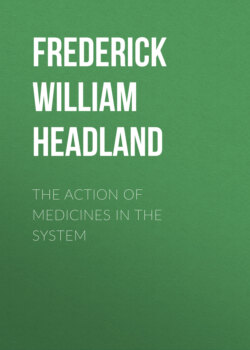Читать книгу The Action of Medicines in the System - Frederick William Headland - Страница 7
На сайте Литреса книга снята с продажи.
ON SOME OF THE MORE IMPORTANT CLASSIFICATIONS OF MEDICINES, AND OPINIONS OF AUTHORS RESPECTING THEIR ACTIONS.
ОглавлениеTable of Contents
I have thought it necessary, before stating at length my own conclusions, to refer to some of the more important statements of authors concerning the subject of which I have to treat; because by so doing I may to some extent indicate what points are to be regarded as determined and proved, and what as still unsettled, and point out where I can agree with other writers, and where I am disposed to differ from them.
The opinions of authors on the general action of medicines are in most cases best ascertained by observing the manner in which they have arranged and classified them, grouping together those which they consider to be alike in their mode of operation.
Differences of opinion respecting individual medicines will be best considered afterwards, when we come to discuss those medicines. We are now to make inquiry as to the action of classes and groups. So that, in examining classifications as a key to the opinions of writers on this matter, we are only concerned with those which are founded in some way on the effects and operations of medicines.
Now there are three different points of view from which the action of a medicine may be regarded. We may ask—1. What is the ultimate effect of its action on the system? 2. To what organ or tissue is its action directed? 3. In what way does it operate?
In other words, we may speak of the result of the action of a medicine, of the direction of the action of a medicine, or of the mode of operation of a medicine.
The first of these questions is the simplest, and may be answered from experience. We know that one medicine is a purgative, because it opens the bowels. We call another an alterative, because the manifestations of vital action are somewhat different after its use from what they were before. The last question is the most difficult to answer, because it involves the exact mode in which a medicine first behaves itself, so as to bring about its recognised operation.
Though the arrangements and theories of authors have generally taken into account all three of these questions, yet they have usually given greater prominence to one or other of them. And according to this their predominant idea, I will take the liberty of grouping them into three schools for the sake of convenience; considering, first, some theories and therapeutical arrangements which are based upon the ultimate effect of medicines; secondly, some that depend upon their local tendencies; and thirdly, some others that concern their mode of operation.
Among those who have directed attention to their ultimate effect, regarding that as generally sufficient for practical purposes, are included the great majority of those who have classified medicines. Such arrangements are practically useful, as by their means we are enabled easily to select a medicine which shall produce a required result. A classification founded upon local tendency is such as hardly to admit of practical application, for it is too vague. It is said that the action of mercury is directed to the blood; that of a tonic, to the muscular system. It is not said how they operate, or how these parts are affected. The terms employed are too wide and indefinite. Supposing the word Neurotic to signify a medicine acting on the nerves, we cannot say that any known medicine may not at some time or in some way act on the nervous system. The same term means a very different thing when found in a classification based on the mode of operation of medicines, for then it signifies a medicine acting on the nerves in a certain way which is defined, and it conveys to us an amount of information respecting that medicine and its applicability which we had not otherwise acquired. A classification of this third kind, though difficult of construction, would naturally be of great practical and scientific utility. The precise mode in which groups of medicines operate has first to be discovered and laid down, together with the results of that operation; and it has then to be proved that each remedy included in a class operates in the exact way predicated of that class. None which do not do so can be consistently included in it. Such an arrangement is precise; there may be a great deal of error, but there is very little vagueness about it. Each name and term should contain in itself and in its position an exact description of the general action of the substances included under it. Such an arrangement I have attempted to construct myself, as it is with the mode of operation of medicines that I am particularly concerned. The chief and obvious objection to such a classification consists in the insufficiency or insecurity of the data which we have to guide us. Thus the best and safest way is to select as the bases of primary subdivision those distinctions which admit of being the most readily and firmly established, and not to rest it on a number of uncertain or questionable hypotheses.
